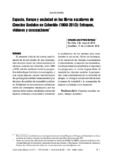Espacio, tiempo y sociedad en los libros escolares de Ciencias Sociales en Colombia (1990-2010): Enfoques, visiones y concepciones

View/
Share this
Date
2014-12-31Author
Arrieta Barbosa, Armando Luis
Citación
Metadata
Show full item recordDocuments PDF
Abstract
El presente artículo da cuenta parcialmente de los resultados de una investigación doctoral sobre los libros escolares de ciencias sociales en Colombia, entre 1990 y 2010, estudio realizado desde la perspectiva del enfoque histórico-transcomplejo, y que sigue algunas pautas metodológicas del paradigma histórico-hermenéutico y las técnicas de análisis de contenido cualitativo.El objetivo de este escrito es reflexionar sobre los conceptos manejados por los autores de los textos estudiados acerca del espacio, el tiempo y la sociedad, y observar la pertinencia de los mismos para comprender la era actual. Entre los hallazgos, se da cuenta de las visiones eurocentrista y etnocentrista, al exponer los contenidos, el enfoque temático-positivista al organizar los programas, la visión fragmentada al concebir las ciencias sociales, la perspectiva lineal-unidimensional al entender el tiempo, el enfoque social-estructuralista al pensar la sociedad y la concepción de espacio sin tiempo y sin humanos. This article is part of the end-result of a doctoral research on the space, the time and the society in textbooks of social sciences in Colombia between 1990 and 2010. A study based on the historical trans- complex approach, the hermeneutic historical paradigm, and techniques of qualitative content analysis. The purpose of this paper is to reflect on the concepts used by the authors of the texts studied about space, time, and society and to observe the relevance of these to understand the current era. Among the results, this paper highlights the Eurocentric and ethnocentric views when exposing the contents: the thematic-positivist approach used when organizing the programs: the fragmented vision to conceive Social Sciences: and the linear one-dimensional perspective to conceive time, the social- structural approach to think society, and the concept of space without either time or human beings.

